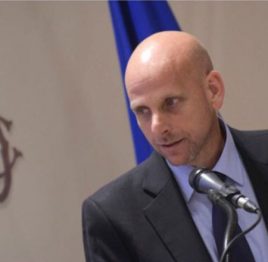
#People First: this is the motto chosen by the UN to mark 2023 International Day Against Drug Abuse and Illicit Trafficking, June 26. Only ten days ago, June 16, in its 2022 Report, the European Monitoring Centre for Drugs and Drug Addiction (EMCDDA) found that in the Old Continent drug availability and use remain at high levels across the European Union, in particular, cannabis, cocaine and crack are flooding the EU ‘market’. On the occasion of the World Day, the Italian Therapeutic Communities Federation (FICT) launched the slogan “#EduCare alle relazioni”, (#Relationships Education), to reflect on the importance of listening to young people as well as adults, to provide a renewed educational covenant based on values and pursuit of meaning. SIR discussed the issue with FICT chairman Luciano Squillaci.
 The motto chosen by the UN perfectly reflects what FICT has been calling for for a long time: put the person at the centre of concerns…
The motto chosen by the UN perfectly reflects what FICT has been calling for for a long time: put the person at the centre of concerns…
We welcome this year’s theme for the Day: at last, the focus is not on psychoactive substances or narcotic drugs per se, whether legal or illegal, but on the individual, the only element that can somehow help us navigate the vastly unchartered territory of drug addictions, unfortunately. First of all, it should be remembered that drug addictions are only a part, illegal drug addictions are only a fraction of this part:
there are both legal – alcohol or psychotropic drugs, for example – and illegal substance addictions. Then there are so-called “behavioral” addictions such as gambling, internet addictions, along with emotional addictions. In short, the subject of addictions encompasses a vast and extremely complex area, which cannot be addressed in terms of categories.
Indeed, all policies adopted to date to tackle the issue of addiction and the fight against narcotic drugs have failed miserably because they disregarded the individual’s inherent complexities and uniqueness.
 What does individual uniqueness entail?
What does individual uniqueness entail?
We consider it essential to change the approach, i.e. to put the person back at the centre of concern. This means not to start from their problem, but from the actual needs of every person.
There is nothing as complex as addictions. In fact, a person with an addiction problem also has a health, social, economic, occupational, relational, and in many cases criminal problem.
When it comes to drug addiction there are manifold factors at play, hence a one-size-fits-all strategy is hardly effective.
Addictions cannot be tackled simply by taking addiction as a starting point, as it is only the outcome, the end result. It is necessary to address the root causes, the most complex factor at play. But this can be done only by putting the person at the centre of concern, which in turn puts on the sidelines most of the ideological battles and diatribes of the past years, since there is nothing more divisive than drug addiction. However, such divisions often start from the wrong assumptions. One such example is the political fight over the legalisation of cannabis. While the controversies are raging – and this is said by someone who never considered legalisation beneficial – the figures show an upward trend in cocaine and crack cocaine availability and use. And while in the past cannabis was the first drug, evidence suggests that cocaine and crack cocaine are now primary drugs.
As usual, the spread of narcotic substances outpaces our best efforts, wanting to keep chasing them seems to me a losing game.
 What does the FICT Observatory data reveal?
What does the FICT Observatory data reveal?
We have been collecting facts and figures for several years: we offer our services throughout Italy to over 6,000 people in our care every year, as many as 50,000 if we include outreach activities. This population of 6,000 people, which in fact accounts for almost half of all those receiving treatment from private accredited services, provides across-the-board data on the situation in Italy, and allows us for some reflection on a number of aspects. First of all, the spread of cocaine and crack cocaine is an upward trend that has been growing steadily for the past five years.
Cocaine and crack cocaine, which used to be secondary to other substances, have now increased exponentially.
Looking back to the 1970s and 1980s, up to the early 1990s, when cocaine was the ‘rich man’s drug’, of daddy’s boys, nobody would have imagined the high rates of cocaine availability and use today. Wastewater surveys provide clear evidence of this.
 What is the reason for this cocaine phenomenon?
What is the reason for this cocaine phenomenon?
It’s a question of ‘market’. Substances are for self-medication. Heroin used to be a means of escaping from reality. High performance is today’s requirement, and cocaine meets this demand. A further element emerging from our findings and confirmed by the Report to Parliament is that single substance addicts no longer exist: the vast majority, I would say the totality, are poly-drug users, combining different substances depending on available supplies, as well as the various needs.
Heroin or cocaine-only users are rare, while the vast majority mix alcohol, psychoactive drugs, cocaine, heroin, hallucinogens, cannabis – which remains the most widely abused drug.
 Do your figures coincide with those of the Report to Parliament?
Do your figures coincide with those of the Report to Parliament?
Most definitely, even though our figures precede those of the Report to Parliament. We assess the trend of the previous year’s data in February because our intervention measures must be planned in advance, whereas the time required for the Report to Parliament is much longer, but our figures are consistent with it. Moreover, although the Government is correctly expanding the scope of addictions, reference was only made to illegal substance addictions and persons in drug rehabilitation care – approximately 130,000 in Italy out of an estimated total of more than 500,000 persons who regularly abuse of illicit substances, amounting to 1 in 5. The real problem remains unchanged:
despite the efforts towards innovation, carried out by local communities on an individual basis, the drug treatment network in Italy is outdated, having been conceived for heroin addicts and unable to respond to the changing needs of the last few years.
 With respect to the data released on June 16 by the European Drug Observatory, where does Italy stand?
With respect to the data released on June 16 by the European Drug Observatory, where does Italy stand?
Our data are in line with those of Europe. Evidence suggests an increase in cocaine use, a new wave of opioid addictions, and the most striking finding concerning the mean age of first use of drugs, which is steadily decreasing. This figure is confirmed by our Observatory:
increasing numbers of parents turn to our counselling centres for advice concerning their 12-13 year-old teenage children who have started taking illicit drugs. It’s a worrying situation.
That is why it’s so important to put the person at the centre of concern, which means giving centre stage to the relationships that qualify him or her. Education is the greatest challenge. At the moment we are like the team that yearns to win a game but does not take to the pitch.
 Following your metaphor, what is required to take to the pitch and win?
Following your metaphor, what is required to take to the pitch and win?
Resources are certainly needed if you want to take to the pitch.
In this respect, one of our requests to the Government has been answered: the Department for Anti-Drug Policies has been strengthened, our delegate, Alfredo Mantovano, has successfully networked with the various ministries. The multi-faceted and complex nature of addictions is thus very clear to the Government. Our requests include the re-establishment of the Anti-Drug Fund – unexpectedly scrapped in 2004 -. This Fund is sorely needed to create an area of prevention and reintegration into the job market. Besides providing resources, there is need for an overall investment, given that addiction is an growing challenge for the whole of society and especially for the young people of our local communities. Let us remember that unfortunately increasing numbers of young people today are using substances ranging from licit, alcohol and the like, to illicit substances.
There is a massive diffusion, a huge availability of substances, both on the street and on the dark web, which means that the education and prevention aspect has to be addressed in a systemic way, and education cannot be left only to experts or to drug treatment centres.
Finally, we face a major challenge in terms of the messages we send out.
Consider the Casal Palocco tragedy: it’s paradigmatic of the cardboard, image-based society crashing into a Smart.
In fact, even the pleasure of transgression has disappeared.
Transgression used to be part of the development of our adolescents and young people: transgression allowed them to test the limits. The message that we have been instilling in our young people is that there is no longer a limit, and therefore there is no longer a need to transgress. Indeed, there is nothing more conformist than the behaviour of these young people. Although it’s tempting to claim that the young driver was under the influence of illegal substances, we can hardly attribute everything surrounding this tragedy, which is emblematic of the ‘normality’ of our society, to the cannabis used by young people. It would be, as so often in the past, a meaningless way of clearing one’s conscience.
 Is that why the FICT has chosen the slogan “EduCare alle relazioni” (Education for Relationships) for World Drug Day?
Is that why the FICT has chosen the slogan “EduCare alle relazioni” (Education for Relationships) for World Drug Day?
Exactly, with a play on the words ‘educate’ and ‘EduCare’, i.e. taking care.
For us, education is all about caring for people, in our view, the challenge of education is crucial at the moment, not only in relation to drugs, but also in a broader sense.
The Casal Palocco incident – which happens almost every day – is a reflection of a society that needs to change. And because children are our future, either we start investing in our future again, or we will never really recover.












